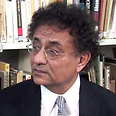The Labor Party's Knesset list
includes a series of candidates with a past which, how should I put it, kind of finds it difficult to match the headline of a "Zionist camp."
Merav Michaeli called on mothers in Israel, during a live broadcast on Army Radio of all stations, not to send their children to the IDF. Prof. Yossi Yonah signed a petition supporting soldiers refusing to serve in the territories. Zohir Bahalul, who has won a secured spot, congratulated a Lebanese woman who organized one of the flotillas to Gaza.

Stav Shaffir strongly objected, and even cried, when another candidate on the list, Itzik Shmuli, insisted on singing "Hatikva," Israel's national anthem, during one of the social protests.
Generation Gap
Eitan Haber
Op-ed: While the fathers' generation burnt with ideological fire, the Likud's princes were born into the government and realized – sometimes the hard way – that their parents' dreams were unrealistic.
Those who say that poet Nathan Alterman, Berl Katznelson (one of the intellectual founders of Labor Zionism) and Israel's first Prime Minister David Ben-Gurion are turning over in their graves are right. They are joined by many others who belong to the generation that established the State of Israel.
The Likud is not the only one criticizing these comments. Many of the supporters of the historical Labor Movement are looking at the new candidates with dismay. And I too, if I may admit, have written against the post-Zionist crawl to a Zionist party.
The years go by. Michaeli and Shaffir have made it into the Knesset. They both excelled in social activity, and even a thorough search will not find a trace of their old views. The same applies to Yonah. He has gone through a change. He has occasionally been cursed by the anti-Zionist camp's commissars.
Even Shelly Yachimovich has admitted that she voted for Hadash in the past. She went through a change too. She even dared say things that sounded like empathy towards settlers. And following the change, she turned into the punching bag of many of those located one millimeter to her left.
But because we are dealing with a Zionist ideology, we should mention that many of the Likud's Knesset candidates blatantly oppose a solution of two states for two people. The leader, Prime Minister Benjamin Netanyahu, says one thing. His party, or at least a significant part of it, says the opposite.

Likud's Knesset candidates. 'The day Netanyahu decides to make a historic compromise, his party will leave him' (Photo: Motti Kimchi)
In the Labor Party, the candidates are at least getting in line with the leadership. In the Likud, there is open defiance. Danny Danon and Zeev Elkin, not just Tzipi Hotovely and Moshe Feiglin who quit the party, have adopted an independent foreign policy, which is closer to Uri Ariel's Tkuma party than to Netanyahu's views.
There is a Zionist right, but in the Likud and rightward there is a noticeable representation of the post-Zionist right. Those who build one big state here are not Zionist. Those who want to annex the Palestinians from the right are no different from those who want to annex them from the left. Those who fulfill the binational vision are post-Zionist.
So the Likud is right in its arguments against different candidates on the Labor list. But the Likud itself, both ideologically and practically, is fulfilling the Palestinian dream of one large state.
There is a major, essential difference between Labor and the Likud: The day Netanyahu decides to make a historic compromise, his party will leave him. He will need another big political bang, while leaning on the center and the left.
The day Isaac Herzog and Tzipi Livni decide to make a historic peace move, which won’t be much different from the plans we are already familiar with (the Clinton outline, the Olmert proposal, Kerry's draft), their party will support them.
So the Likud's arguments against the Labor list are very true. But they apply much more to the Likud itself. How many Likud members are prepared to declare that they accept Netanyahu's far-reaching compromises as part of the negotiations with US Secretary of State John Kerry? They are pretending not to know. They are in a state of repression.
Why it's better to place a leader in the display window who looks slightly better than many of the party's other members, who are closer to the radical right. Until Election Day on March 17, they will likely use their right to remain silent.

















